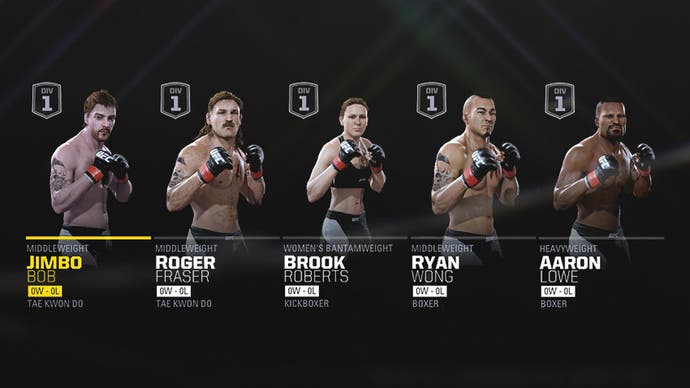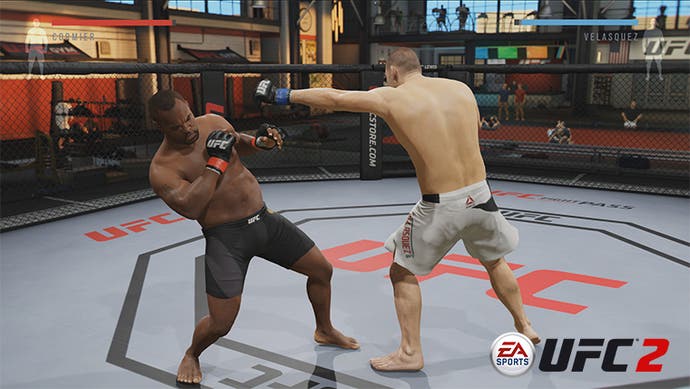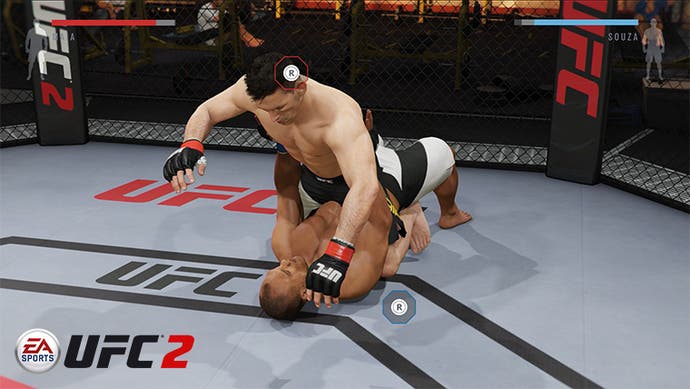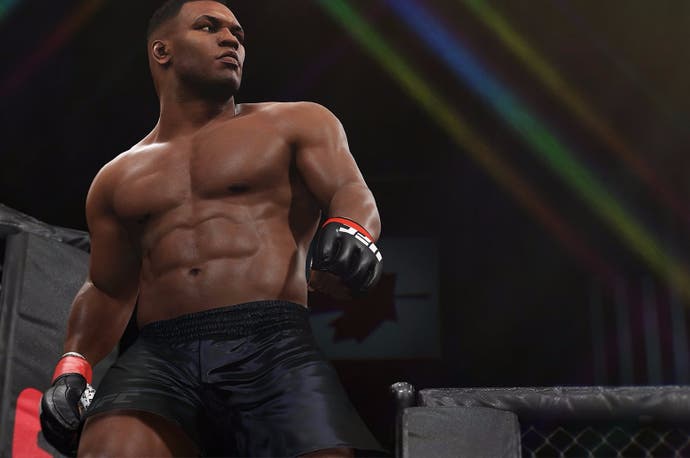EA Sports UFC 2 review
Stand and deliver.
On December 12, 2015, Conor McGregor broke the record for the fastest knockout in a UFC title fight. It took just 13 seconds for the Irish featherweight to land the critical punch, flooring the incumbent champion, José Aldo, in less time than it takes to brew a cup of tea. The bout was remarkably short, but the fans at Las Vegas' MGM Grand felt anything but shortchanged. They'd been present at one of the greatest moments in their sport's short history.
This unpredictability - the way a fight, or indeed a championship belt, can hinge on a decisive millisecond - is a huge part of UFC's personality. But how it would work in a video game? How would a player feel having spent five rounds dominating an opponent only to lose from a lucky punch? Or, indeed, for a fight to be over within a quarter of a minute, just because of one missed block?
It's challenges like these that makes MMA such a tricky proposition for developers. In a sport that is a much about moments of explosive violence as it is technical skill, how do you strike the right balance? It's this reason, as much as any other, that explains why there's never been a UFC game that's really hit the mark. To their credit EA Canada have some gone some way to change that with UFC 2, in what must be the sport's best interactive incarnation to date.

What impresses most, in your first few minutes of play, is the staggering detail of the fighter models: every scar, every broken nose, and every tiger tattoo is rendered in pixel-perfect detail. The action outside the ring, too, is flawlessly rendered, with every detail from lighting and fighter entrance animations to crowd noise and commentary meticulously to create an atmosphere that hits all the right notes. With such top-notch presentation married to a fluid, kinetic combat engine, UFC 2 has a decent claim to be one of the most life-like fighting games ever made.
In some ways, I can see how this authenticity could put off people who aren't already fans of the sport. When punches and kicks connect, the result can seem disappointingly flabby when compared to, say, a Street Fighter or WWE game. But that's kind of the point. These matches, bar some small caveats, are as true to real life as they can be - and that's what makes the violence all the more affecting.
Every time I get knocked to the canvas I find myself inadvertently flinching, or sucking my teeth, in a way I seldom have before when suffering on-screen pain, and the feeling of being pinned into a corner, knowing you're one blow away from being felled, is hugely tense. You feel connected to your fighter - you want to avoid a beating just as much as you want to win.
Because of this, the "stand-up" game, as it's called (when you're, er, standing up), is more of an absorbing, tactical battle than you'd initially think. It's all about timing your blocks and swings and trying to out-think your opponent as you hop around the Octagon, waiting for your stamina to recharge. Learning the right combinations, both to attack as, and defend from, different fighting styles offers tremendous depth, and will provide hours of entertainment for UFC devotees. Learning to correctly time a flurry of attacks and overwhelm your opponent gives a wonderful sense of "flow" that will keep many coming back even after most of the game's challenges have been overcome.

Where UFC 2 falls down, however (if you'll excuse the pun), is when the action hits the mat. Clinch fighting and submission holds are notoriously hard to translate to video games - it's been 25 years since I hammered A on my Game Boy to deliver a Sharpshooter, and no one's really come up with anything better since then - and UFC 2 makes little headway in this regard. The basic right-stick grappling system is simplified from the last UFC game, but to an extent where it now feels rather arbitrary - like remotely guiding your way through a series of animations, which goes in complete opposition to the dynamic feel to the rest of the game.
On the other extreme, submission holds are laboriously complicated: there's six screens of text to cycle through just to get to grips with the "basic" system, and only after hours with the game did I begin to feel a decent level of understanding. Of course, the developers are caught between a rock and a hard place here - the submission holds are too difficult, so I avoid them, the clinch fighting is too easy, so it feels cheap - but nevertheless I think many players will just find themselves avoiding these two parts of the game whenever possible. Considering how big a part of MMA these disciplines are, it's a much bigger problem for UFC 2 than, say WWE2K16, when these systems are flawed. EA Canada have even included a "Knockout" mode which leaves out the ground game entirely - which, to me, feels something like an admission of guilt.
Beyond the in-ring action, EA provides the usual pleasing variety of game modes we've come to expect. Season Mode is a rather dull affair - while it's enjoyable levelling up a fighter and building their career, the activities between matches quickly become dull and repetitive. Punching a virtual punchbag is about as much fun as it sounds, and it feels like a bit of wasted opportunity not to make more of the game's 250 licensed fighters, even if it was just Joe Rogan popping in for the odd pep talk.

Online play is seamless and, having played at a variety of times across the day, I never had to wait too long to find a partner. Meanwhile, while EA's Ultimate Team mode is, on the face of it, a strange fit for UFC, a card collecting system works just as well with special moves and power-ups as it does football players, even if it is more exciting to find Messi in a gold pack a slightly better punch. The UT cycle of playing, upgrading, and then needing to play again for the next upgrade (even though you're probably going to be late for work) is devilishly addictive, and I only wish it could be applied to more productive areas of my life (Tax Return Ultimate Team, anyone?).
What you're left with is an impressive package that represents both a marked improvement from its predecessor and a real treat for UFC fans - even if it may not capture everything that's great about the sport. For anyone else looking to dip their toe into a new fighting genre, the flaws in the ground game make it just that bit harder to recommend. Some sports simply suit being made into video games better than others. And until a developer works out a way of grappling that doesn't involve mashing buttons or twizzling analog sticks (I'm imagining some kind of touch-responsive plastic torso), MMA won't ever quite feel at home on a games console.
